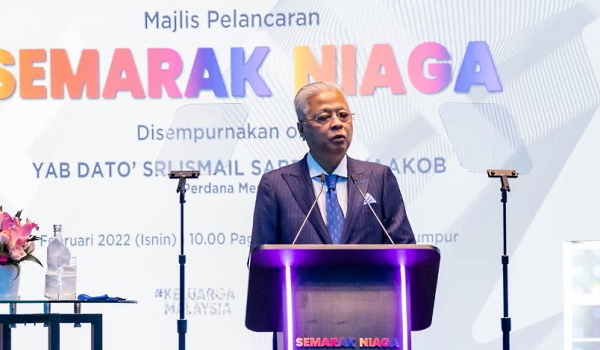Sin Chew Daily
Prime minister Ismail Sabri Yaakob has said the government will set aside RM40 billion from the 2022 Budget for the SemarakNiaga Keluarga Malaysia Program aimed at helping SMEs and micro businesses recover and rebuild their competitiveness after the pandemic.
The RM332.1 billion Budget 2022 can be divided into four major parts: RM223.5 billion for operating expenditure, RM75.6 billion for development, RM23 billion for COVID-19 fund and RM2 billion for emergency reserves, and there is no mention anywhere of the RM40 billion allocation.
As such, instead of government allocation, it should be more aptly labeled as a “loan that has to be repaid someday”. It is definitely not a “free lunch” that we can enjoy!
RM40 billion is not a small amount of money, especially after the possible tapering of the coronavirus pandemic in a few months’ time, when low-interest loans will provide the much needed lifeline for companies with good prognosis of survival.
If the loans are provided in a completely fair and transparent manner, they will be the living water that will enliven commercial activities, if the companies receiving them use the money wisely and prudently.
The two-year pandemic has sent many local businesses struggling for survival, and has over time formed into a vicious cycle.
Many local companies find themselves unable to disburse their staff’s salaries and have therefore lost their employees; others are unable to pay their rents and are forced to evict; some can’t pay their suppliers and have their sources of materials severed; while manufacturers suffer from unsold products that pile up at their warehouses.

In short, when there is problem with any of the processes from material supply, production, logistics to retail sale, the supply chain will be broken. If the government doesn’t do anything to help, allowing the vicious cycle to go on uncurbed, many local businesses will have to wind up their operations, sending unemployment rate soaring and causing the country’s economy to slip into a recession.
The local currency will also begin to lose its value and spiraling inflation will ensue. In worst case scenario, the country could go bust!
As such, to break this cycle, we will require the injection of fresh funds, and this can take the form of government loans for SMEs and micro businesses.
Another way to revitalize the economy is for the government to expand public infrastructure spending with private sector participation encouraged, with the objective of creating new business and employment opportunities to jumpstart the economic development.
Take the United States for instance, President Joe Biden signed the US$1.2 trillion Infrastructure Bill (approximately 6% of the 2021 GDP) late last year. The bill, aimed at stimulating the US economy and strengthening its international competitiveness, includes transportation, networks, drinking water and green projects, and will create some 700,000 job opportunities.
All these projects will be undertaken by American companies because Biden wants to use the infrastructure projects to enliven the American businesses and in turn, the country’s economy.
Consequently, a prerequisite for implementing national infrastructure projects is that they must be anchored by Malaysian companies. If all the major job parcels are outsourced to foreign firms, we will only create job opportunities for entry level workers and this will not help much in revitalizing the national economy.
Additionally, if foreign technical expertise is required, we must demand technology transfer from participating foreign firms in order to lift the country’s technological levels.
These infrastructure projects must also cater to the needs of the Malaysian people and benefit them. We don’t want any more “white elephant” projects.
Last but not least, all these projects must be subjected to close supervision by the opposition, from needs appraisal to tendering to the completion of works. This is to block out any chance for corruption.
To enliven commercial activities, we feel that the provision of low-interest loans is only one of the avenues, another being systematic implementation of national infrastructure projects which are broadly participated by local private companies.
ADVERTISEMENT
ADVERTISEMENT


































